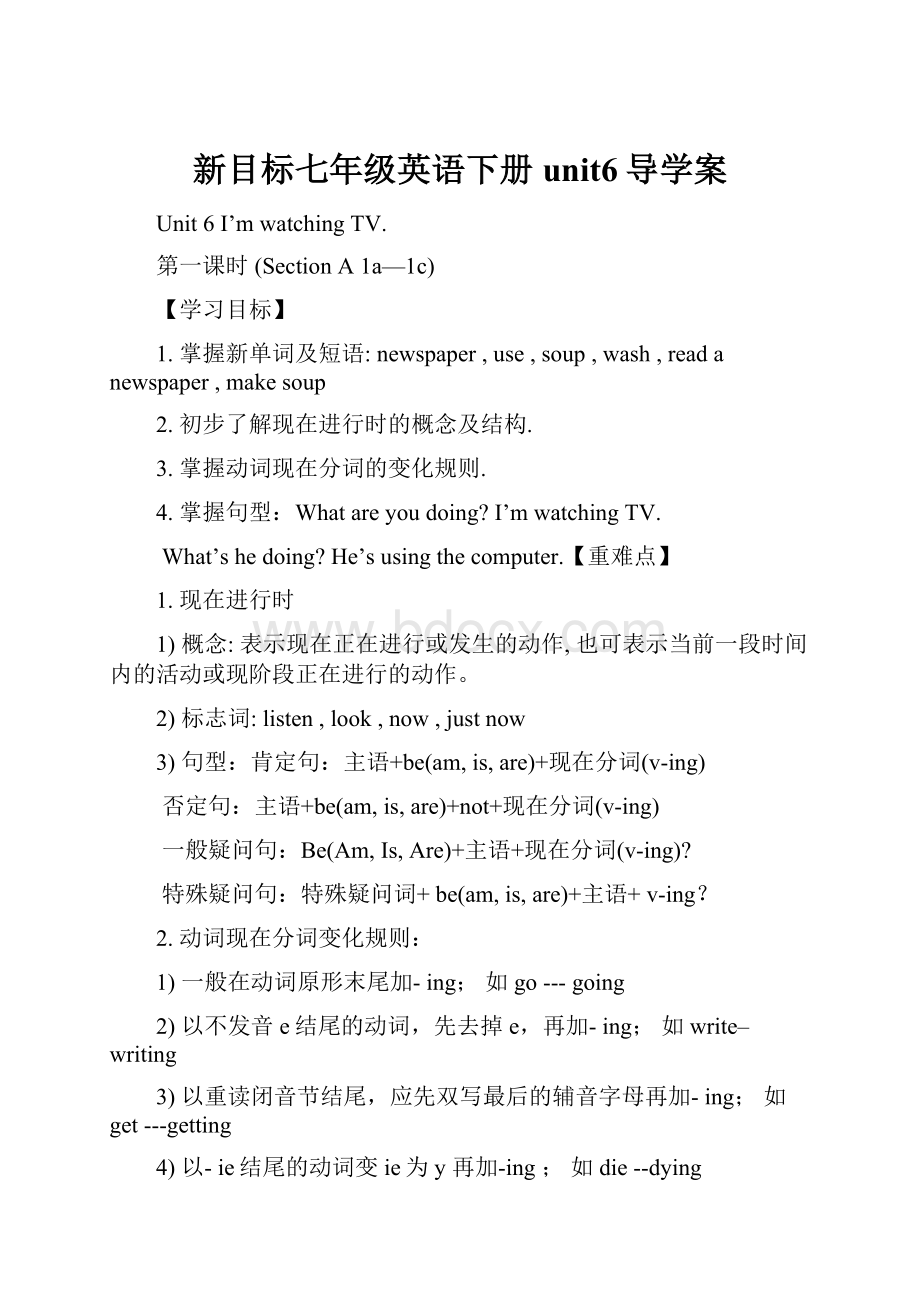新目标七年级英语下册unit6导学案.docx
《新目标七年级英语下册unit6导学案.docx》由会员分享,可在线阅读,更多相关《新目标七年级英语下册unit6导学案.docx(13页珍藏版)》请在冰豆网上搜索。

新目标七年级英语下册unit6导学案
Unit6I’mwatchingTV.
第一课时(SectionA1a—1c)
【学习目标】
1.掌握新单词及短语:
newspaper,use,soup,wash,readanewspaper,makesoup
2.初步了解现在进行时的概念及结构.
3.掌握动词现在分词的变化规则.
4.掌握句型:
Whatareyoudoing?
I’mwatchingTV.
What’shedoing?
He’susingthecomputer.【重难点】
1.现在进行时
1)概念:
表示现在正在进行或发生的动作,也可表示当前一段时间内的活动或现阶段正在进行的动作。
2)标志词:
listen,look,now,justnow
3)句型:
肯定句:
主语+be(am,is,are)+现在分词(v-ing)
否定句:
主语+be(am,is,are)+not+现在分词(v-ing)
一般疑问句:
Be(Am,Is,Are)+主语+现在分词(v-ing)?
特殊疑问句:
特殊疑问词+be(am,is,are)+主语+v-ing?
2.动词现在分词变化规则:
1)一般在动词原形末尾加-ing;如go---going
2)以不发音e结尾的动词,先去掉e,再加-ing;如write–writing
3)以重读闭音节结尾,应先双写最后的辅音字母再加-ing;如get---getting
4)以-ie结尾的动词变ie为y再加-ing;如die--dying
【预习检测】
一、通过预习,翻译下列词语。
打扫房间__________在电话上交谈_____________
看报纸________________做汤___________________
听CD_______________使用电脑__________________
二、写出下列动词的现在分词。
dowatchreadcome
talkeatputhave
listenenjoyrunstudy
swimplayshoplook
【高效课堂】
Step1Learnthenewwords.
Step2Presentthestructures.
Step3Pairwork:
Makeupconversationslikethis:
A:
Whatareyoudoing?
B:
Iam…ing..
C:
Whatishe/shedoing?
D:
He/Sheis…ing.
Step4Readthewordsin1aandmatchthemwiththeactivities.
Step5Listening1b
Listen.Whatarethesepeopledoing?
Writenumbersfrom1a.
【课堂检测】
三、根据句意及汉语提示完成下列句子
1.Look,the boys are (打篮球).
2.Look!
Jennyis(打扫)theclassroom.
3.Listen!
DaveandMaryaretalking(通过)thephone.
4.Johnis(读)abooknow.
5.I(talk)onthephonenow.
6.Listen!
He(sing)anEnglishsong.
7.That(sound)good.
8.WhatTomandJim(do)now?
四、句型转换
1.Iamdoingmyhomework.(变为一般疑问句)
______you________________homework?
2.Thekidsareflyingkitesoverthere.(提问划线部分)
____________thekids____________overthere?
3.Istheboylisteningtotheteacher?
(作肯定及否定回答)
.Yes,./No,.
4.Thestudentsarereadingbooksatthelibrary.(变否定句)
Thestudents______________booksatthelibrary.
5.Heislisteningtomusic.(变为一般疑问句,作肯定回答)
____he______________tomusic?
.
Unit6I’mwatchingTV.
第二课时(SectionA2a—3c)
【学习目标】
1.掌握新单词及短语。
2.继续学习现在进行时。
3.学会运用what引导的特殊疑问句询问活动。
【自主学习】
一、用动词的现在分词结构表示下列词或词组。
1.做作业2.看电视
3.吃饭4.电话谈话
5.打扫房间6.看书
7.去看电影8.用电脑
二、将下列句子译成英语:
1.我在看电视。
2.比尔在游泳。
3.汤姆在画画。
4.迈克在跑步。
5.他们正在踢足球。
【互助】
1)Hello?
ThisisJenny.你好!
我是詹妮。
此用法是电话用语,注意运用以下句式:
2)①询问对方是否在lsthat…(speaking)?
/
ls…there?
②在电话中介绍自己时:
Thisis…(speaking).
实践:
你好!
我是林涛。
你是安吗?
Hello!
LinTaospeaking.
Ann?
【课堂练习】
1.Theboyislisteningtotheteacher.(提问划线部分)
____________theboy__________?
2.Sheishavingbreakfastnow.(变一般疑问句并做肯定回答)______she________________now?
Yes,_______________________.
3.Annaoftenplaysthepianointheevening.(用now代替intheevening改写句子)
Anna_________________thepianonow.
4.Theyarecleaningthehouse.(对划线部分提问)
arethey?
5.Hewantstogothemovies.(改为否定句)
Hetogotothemovies
【自我检测】
一、选择
1.___!
Howmanybirdscanyou___inthetree?
A.Look,watchB.Watch,seeC.Look,seeD.See,look
2.Iliketo___TVonSunday.
A.lookB.watchC.readD.see
3.Heis___abook.
A.watchingB.lookingC.seeingD.reading
4.He___atennismatchonTVnow.
A.watchingB.readingC.lookingD.iswatching
5.Look!
Gina_____abookunderthetree.
A.isreadingB.islookingC.readsD.sees
6.—__________theyplayinggamesoverthere?
—Yes,they__________.
A.Do,doB.Are,areC.Do,areD.Are,do
7.—Areyoulisteningorwriting?
—__________.A.I’mlistening.B.I’mnotwriting.C.Yes,Ido.
D.No,Iamnot
8.Thereisaboy__________ayoungtreeinthegarden.
A.plantB.toplantC.plantingD.plants
9.Doyouwant________tothemovieswithusthisevening?
A.goB.togoC.goesD.going
10.—_____areLisaandTimtalkingto?
—TheirEnglishteacher.A.WhatB.WhoC.WhereD.When
11.Thankyou__________thelettersandphotos.
A.onB.inC.forD.to
12.John’sparents_____towork____7:
00_____themorning.A.goes;at;inB.go;in;inC.go;in;atD.go;at;in
13.Jennyis__________agreenshirttoday.
A.puttingonB.wearingC.putonD.wear
Unit6I’mwatchingTV.
第三课时(SectionB1a—2c)
【学习目标】
1.能用现在进行时描述某场景中人们正在进行的活动。
2.掌握新单词及短语。
【预习检测】
根据首字母或汉语提示写出单词。
1.WhatIshed_________?
Heisr__________.
2.Mikeisp_______soccer.
3.Whatarethestudentsdoing?
They’rec________theclassroom.
4.He’s_________(看)anewspaper.
5.Therearemany_______(图书馆)inourcity.
6.Whereisheswimming?
Atthe___________(游泳池)
7.ZhuHuiisnowsEnglishintheUS.
8.TheboyisfromA.HeismyAfriend.HishomeisinNewYork.
9.OnDBF,myybrotherandIoftenwatchtheboatronTV.
10.Thezongziis(美味的).
11.ZhuHui(想念)hisfamilyandwtomeetthemsoon.
【当堂训练】
翻译下列句子:
1.你在干什么?
What________you__________?
我在看电视。
I.
2.约翰在做什么?
John?
他在做作业。
He.
3.大卫和玛丽在吃午饭。
DaveandMary
4.迈克在做什么?
WhatMike?
他在打篮球。
He.
5.Julia在图书馆读书。
6.他在池塘(atthepool)游泳。
7.Mike在操场(ontheplayground)打篮球。
【检测达标】
一、用所给动词的适当形式填空
1.Look!
Thestudent_______(clean)theclassroomnow.
2.–Whataretheboysdoing?
--They(swim)intheriver.
3.—Whatareyou______(do)?
--Iam______(watch)TV.
4.---What_____(be)he_____(do)?
---He________________(read).
5.Someofus_________(like)reading.
6.Here_________(be)yourphotos.
7.KathyandJim_________(sing)now.
8.Thankyoufor_________(give)methephotos.
9.Herearesomeofmy_______(tomato).
10.Don’ttalk!
Lucy_______(do)homework.
二、用方框中的句子完成下列对话。
A:
1
B:
I’mdoingmyhomework.
A:
2
B:
Sheisn’there.
A:
3
B:
4
A.Certainly.I’mcomingnow.
B.Whereisyourmother?
C.Whatareyoudoing?
D.Couldyoucomehere,please?
Unit6I’mwatchingTV.
第四课时(SectionB3a—self-check)
【学习目标】
1.能熟练运用现在进行时
2.能区别现在进行时与一般现在时
【预习检测】
1.Look!
Mycousin(swim)atthepool.
3.MissBlackoften(teach)ussowell.
4.Thanksfor(teach)ussowelll.
5.Let’s(write)himane-mail.
6.谢谢你的来信。
yourletter.
8.这儿是我的一些新书。
someofmynewbooks.
9.我妈妈喜欢在周六购物。
MymotheronSaturdays.
【知识达标】
句型转换
1.Theteachersarehavingameeting.(变否定句)
3.Theteachersarehavingameeting.(用eveningnight改写)
4.Iamstudyingmathintheclassroom.(变一般疑问句)
5.Thesingerissingingsomefamoussongs.(否定句)
6.IamstudyingEnglish,too.(否定句)
7.Dotheyhavelunchatschooleveryday?
(用now替换everyday)
________they______lunchattheschool_______?
8.Whatdoesyoursisterdo?
(改同义句)
What____yoursister’s________?
8.It’shalfpastnine.(划线提问)
9.Tomwantstogotothemovies.(改为一般疑问句)
阅读理解
ManypeopleliketowatchTV.Itisoneofimportantactivitiesofaday.TVbringstheoutsideworldclosertopeople’shomes.SomepeoplesaytheworldisnowsmallerthanbeforebecauseofTV.Perhapstheyareright.What’sgoingoninothercountries?
What’sthelifelikeinthedeepestpartsofthesea?
Well,JustturnontheTV.Turnitonandwatch.Youcanseealotandyoucanlearnalot.Ofcourse,peoplecanalsolearnthroughreadingorlisteningtotheradio.ButwithTVtheylearnbetterandmoreeasily.Why?
Becausetheycanhearandwatch,too.TVhelpstoopenourEyes.TValsohelpstoopenourminds.TVoftengivesusnewideas.Welearnnewerandbetterwaysofdoingthings.
1.Peopledosomeimportantthingsintheday,butoneofthemostimportantthingsisto____________.
A.goshoppingB.watchTV
C.watchafootballmatchD.goboating
2.Itisnotpossibletoseethelifeoffishinthedeepestpartsofthesea,isit?
A.Yes,itis.B.No,itisn’t.C.Yes,itisn’t.D.No,itis.3.WithTVpeoplecanlearnthings________thanonlylisteningtotheradio.
A.betterB.fasterC.moreeasilyD.bothAandC4.Inthesentence“TVbringstheoutsideworldclosertopeople’shomes.”,theword“closer”means“____________”.
A.关上B.近的C.更近的D.更远的
5.Whichofthefollowingisnottrue?
A.Manypeople’sfavoritethingistowatchTV.
B.Today’sworlditselfisbecomingsmallerandsmaller
C.OurmindscanbehelpedtoopenbyTV.
D.WeoftengetnewideasfromwatchingTV.
单元检测题
一、写出下列动词的第三人称单数形式和现在分词Model:
bringbringsbringing
1.make_______________2.swim_________
3.be_______________4.have______________
5.do______________6.buy_____________
7.wash_____________8.carry________________
9.teach______________10.run______________
二、用适当的介词填空
1.Iwanttoswim__________theriver.
2.Theyarelistening__________theteacher.
3.Themallisopen__________6:
00a.m.to12:
00p.m.
4.Doyougoshopping__________Sunday?
5.Herearesomeapple__________you.
6.Whoareyouwaiting__________?
7.Theyarewaiting__________thebusstop.
8.Let’stalk__________thepicture.
9.Canyouhelpme__________mymath?
三、单项选择
1.Look!
Gina_________abookunderthetree.
A.isreadingB.islookingC.readsD.sees2.—__________theyplayinggamesoverthere?
—Yes,they__________.
A.Do,doB.Are,areC.Do,areD.Are,do3.Thereisaboy__________ayoungtreeinthegarden.
A.plantB.toplantC.plantingD.plants
4.__________thefirstphoto,I__________atthemall.A.On;shopB.On;shoppingC.In;amshopingD.In;amshopping
5.Doyouwant________tothemovieswithusthisevening?
A.goB.togoC.goesD.going
6.Thankyou__________thelettersandphotos.
A.onB.inC.forD.to
9.John’sparents____towork____7:
00____themorning.A.goes;at;inB.go;in;inC.go;in;at
D.go;at;in
10.Jennyis__________agreenshirttoday.
A.puttingonB.we